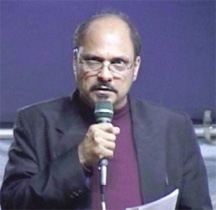Minister of Health Dr Bheri Ramsaran yesterday an-nounced that he has instructed that a multi-agency committee-made up of women’s rights groups and others-to inspect the maternity wards at public hospitals in an effort to address the troubling issue of maternal death.
The minister, while stating that hospitals do have in-house committees that visit the wards and these would continue,

said he does not want a situation where the “cat is put to watch the milk”. He said he wants the multi-agency committee to visit the wards unannounced, speak to nurses and patients and observe what is happening, but in a respectful manner.
He said while the committee, which would be set up Chief Medical Officer Dr Shamdeo Persaud, is not legislated “it is not a request but an instruction”.
The minister was at the time speaking at forum that involve civil society who were expected to help to identify bottle necks and solutions so as to improve maternal and child health care as the country strive to reach the Millennium Development Goal (MDG) number five.
A significant number of the persons present at the forum were from the health sector-employees of the Ministry of Health and Georgetown Public Hospital Corporation (GPHC). But two hours into what was expected to be a consultative engagement, no bottle necks or solutions were identified, instead a significant part of the discussion centred on adolescent health and universal sex education in schools.
Minister Ramsaran in his speech mentioned the recent maternal deaths of Luan Rodney, who died along with her unborn child and a woman who was transferred from a small village near Moruca, Region One and who had arrived at the GPHC from the Kumaka Hospital after giving birth to premature twins in her home.
He said in the case of the woman from Region One there was the issue of the lack of communication since the GPHC was not notified until she was on her way.
He pointed out instead of an empty plane going for the woman had there been communication the plane could have gone with blood and other needed items to treat the woman instead of putting her life at further risk during the medevac. Instead, the blood reached the woman at the Ogle Airport when it was too late.
He also said there are challenges when it comes to work ethic and the attitudes of health care workers and these need to be addressed.
Dr Persaud, in a presentation, pointed to some of the challenges faced in delivering effective maternal health care, which were identified at other forums, and added that over half of the deaths occur due to haemorrhage and hypovolemic shock followed by eclampsia.
According to Dr Persaud, improper management at hospitals also poses a risk for pregnant mothers.
He gave the example of the generator not being put on in time following a power outage at the New Amsterdam Hospital, forcing the doctor to go through a surgery with the use of a torchlight.
He pointed out that it is not just death that occurs, but also because of the unhealthy conditions of wards some mothers become infected with diseases, temporary disabled or they may suffer lifelong effects.
He also made mention of the fact that mothers have to be sleeping two on a bed and these are conditions that need improving in maternal health care. But he said they are working assiduously to improve the situation revealing that there are now consultants managing patients through other doctors at hospitals in far-flung areas. However, he said, many times patients go to hospitals when it is too late.
Meantime, according to Ramsaran, 70 newly trained doctors are expected to return to Guyana shortly and emphasis would be placed on maternal and child health and those who would have been training at GPHC will be sent out to various areas.




